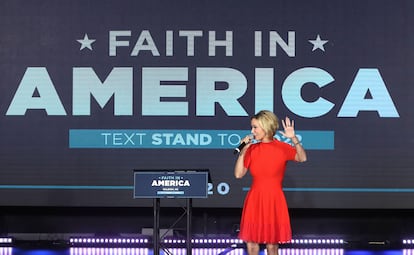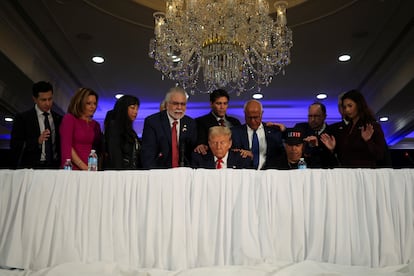Pray, and God will make you rich: Trump elevates prosperity preachers
The rise of televangelist Paula White in the president’s circle propels a religious movement that links faith with economic success

The scene was bizarre even by the standards of the eccentric Trumpist universe. The 2020 presidential election had just taken place. The vote count was already pointing to Joe Biden’s victory, and Donald Trump was beginning to claim fraud. In Florida, a group of faithful Republicans gathered to pray for their leader. Judging by the atmosphere, it seemed more as if they were praying for their messiah. A woman with blond hair and glasses that drooped almost to the tip of her nose spoke. With flushed cheeks, on the verge of a trance, she launched into a litany about “the Lord,” “the recesses of heaven,” and the “demonic confederacy” that wanted to steal the election. Then she began to speak in an unknown language, as if divinity had endowed her with the gift of tongues. She seemed possessed. She issued a warning: a legion of “angels” was on the way to offer heavenly reinforcement to Trump.
The video went viral, of course. And within a few days, it was forgotten. That’s Trumpism: one histrionic character is soon overshadowed by the next. Who would have thought that this particular hothead deserved more attention? But she did.
Born in Mississippi, Paula White, 59, went from being Trump’s spiritual advisor to director of the newly created White House Office of Faith in February 2025. While the position itself has been criticized for bordering on religious secrecy, the person holding it has received criticism even from conservative circles close to Trump, where accusations of “heresy” have even been heard. Why? Because, despite the apparent incongruity of her rhetoric, White has made a fortune—in followers and money—as a star preacher of a movement whose tenets go too far even for those most willing to put their faith at the service of Trump. This is the so-called “Prosperity Gospel,” which White preaches from a megachurch in Apopka, Florida, according to which religiosity is linked to economic success. It’s exactly what it sounds like. “Money follows your value system,” White argues in podcasts, TV shows, and books like Money Matters.
White’s promotion represents a boost for a whole gallery of pastors with similar beliefs, such as Creflo Dollar—yes, his surname is Dollar—who maintains from his church in Georgia that the “believer’s prosperity” is “God’s will”; or Joel Osteen, who also sells a link between devotion and one’s wallet to his Texas congregation. The actor and televangelist Ken Copeland, in his book The Laws of Prosperity, goes so far as to equate dedication to God with an investment. “No bank in the world offers this return!” he marvels. For White and his group, zeros in checking accounts are “a standard for measuring faith,” as the Peruvian biblical scholar Martín Ocaña has observed.
Trump’s ideal creed
The political implications of this mercantilist theology are obvious. If wealth is associated with a good relationship with God—a relationship that, by the way, can be smoothed over by acquiring the various merchandising products sold by these preachers—then poverty is reduced to a mere “sign of impiety” on the part of those who suffer from it, as Financial Times columnist Edward Luce has analyzed. It therefore has no causes that can be objectively combated.
Although the young Trump’s only known place of worship was the legendary New York nightclub Studio 54, as a politician he has made a point of presenting himself as a Presbyterian. It’s not like he boasts of having a pious biography or pretends to have a deep knowledge of Scripture. But he doesn’t need to. As American historian Kristin Du Mez explains in Jesus and John Wayne, his appeal among the Christian electorate is not due to his virtuosity, but—on the contrary—to his embodiment of an authoritarian virility rooted in the evangelical imagination.
Pastor Paula White leads President Trump and Foreign Ministers of the Democratic Republic of the Congo and Republic of Rwanda in prayer 🇺🇸 pic.twitter.com/BCX3sdzFFa
— Margo Martin (@MargoMartin47) June 27, 2025
By choosing White, Trump has hinted at a very particular vision of Christianity, one that, on a personal level, is optimal for imbuing one’s fortune with a sacred veneer—even if his personal fortune owes more to his father than to providence—but which, on a more general level, is also consistent with the neoliberal allergy to wealth distribution. If God decides who is rich or poor, what can the state do about it?
Against “original” Christianity
Ever attentive to shifts in Christian thought, the Spanish theologian Juan José Tamayo identified the so-called “Theology of Prosperity” as one of the pillars of the offensive of the religious far right, to which he dedicated the essay The International of Hate. According to this rising creed, the author observed, if Christians are not rich “it is because they live in sin.”
The Prosperity Gospel has emerged, especially in the United States but also in Latin America, as one of the crudest expressions of “the alliance between economic neoliberalism, political ultraconservatism, and religious fundamentalism” that “is robbing Christianity of its original message,” explains Tamayo, who has just published a new essay, Radical Christianity, in which he makes a theological counterproposal to “Christian neofascism.”
Kristin Du Mez, the author of Jesus and John Wayne, notes that this unique doctrine has permeated American Christianity well beyond the handful of high-profile preachers. “The idea that God blesses good Christians with material success is quite widespread. It often goes hand in hand with opposition to any kind of government ‘handout’ to the poor, who are considered unworthy and guilty of their own poverty,” the historian explains. “This message contradicts traditional Christian teachings about God’s blessing of the poor and the idea that it is harder for a rich person to enter the kingdom of heaven than for a camel to pass through the eye of a needle.”

Du Mez sees White’s rise as a symptom of a wider trend: the rise of “radicalized Christianity” in this second Trump era. “Christian nationalist supporters [of Trump] are overjoyed. It’s becoming increasingly clear that many who claimed to advocate for ‘religious freedom’ actually promote Christian supremacy,” she explains.
White and company also raise concerns in conservative American evangelical circles. Jon Root, an influencer who often spreads messages supporting Trump and his anti-woke crusade, claims she’s “a wolf in sheep’s clothing” and a “false teacher.” Why? Because she “dupes” “vulnerable” Christians seeking answers, “promising them supernatural blessings, such as physical health and wealth,” in exchange for “their hard-earned money,” responds Root, who additionally believes there’s “no biblical justification” for recognizing a female pastor, a patriarchal position that is commonplace in conservative Christian circles. But that’s a whole other story.
Sign up for our weekly newsletter to get more English-language news coverage from EL PAÍS USA Edition
Tu suscripción se está usando en otro dispositivo
¿Quieres añadir otro usuario a tu suscripción?
Si continúas leyendo en este dispositivo, no se podrá leer en el otro.
FlechaTu suscripción se está usando en otro dispositivo y solo puedes acceder a EL PAÍS desde un dispositivo a la vez.
Si quieres compartir tu cuenta, cambia tu suscripción a la modalidad Premium, así podrás añadir otro usuario. Cada uno accederá con su propia cuenta de email, lo que os permitirá personalizar vuestra experiencia en EL PAÍS.
¿Tienes una suscripción de empresa? Accede aquí para contratar más cuentas.
En el caso de no saber quién está usando tu cuenta, te recomendamos cambiar tu contraseña aquí.
Si decides continuar compartiendo tu cuenta, este mensaje se mostrará en tu dispositivo y en el de la otra persona que está usando tu cuenta de forma indefinida, afectando a tu experiencia de lectura. Puedes consultar aquí los términos y condiciones de la suscripción digital.









































